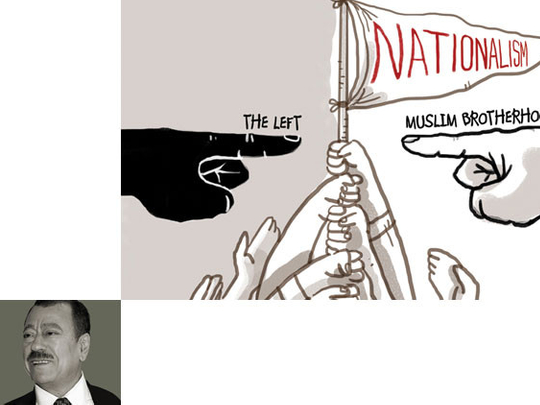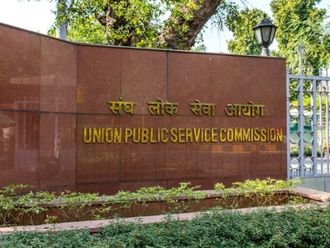
Last week, I visited Egypt after an absence of 18 years. The country has a special place in my heart, not least because I studied there as a youth — both in Alexandria and at Cairo University — and experienced first-hand the generous welcome for which its people are famed.
I met a great many interesting people, from shopkeepers and taxi drivers to President Mohammad Mursi himself. I was also invited to dinner with leading members of the Supreme Council of the Armed Forces (SCAF).
As usual, during this time of the year, the streets of Cairo were boiling — only this time they were boiling politically too. The widening rift between the secular Left and those who support Mursi and the Muslim Brotherhood was one of the main topics of conversation wherever I went. A burgeoning ‘Rebel Movement’ is calling for Mursi to step down and has organised a ‘Rebel Week’ to culminate in mass protests on June 30, the first anniversary of Mursi’s presidency. Egyptians have long been famous for their ability to turn everything into a joke — only these days, the humour is mainly dark. There is widespread disappointment with the fruits of the revolution and the failure of the most dominant political element, the Muslim Brotherhood, to improve the lot of the ordinary people. “Everything’s the same, but with beards,” is a common quip. And it is true that the streets of Cairo reflect an increasing Islamisation of its inhabitants with more veiled women and bearded men than I ever remember.
The media — much of it still owned by Mubarak acolytes — is overtly hostile to Mursi and the Muslim Brotherhood and this only compounds the sense of pessimism one encounters on the street. “Look what the revolution has brought,” a shopkeeper told me. “The economy is in ruins, nobody has any money to spend and the tourists are too scared to come here. There is no security, no stability ... and no electricity!”
The country’s regular power failures are a constant source of complaint. “What have you seen about the Muslim Brotherhood to make you hate them?” another joke goes. “Nothing! We can’t see in the dark.”
There is a common perception among the more thoughtful commentators that the flames of discontent, as well as the political divisions between the liberals and the Islamists, are being deliberately fanned by Mubarak acolytes. Along with the liberal opposition, they calculate that the most effective way to topple Mursi — if he refuses to step down — is through untenable civil unrest. This scenario sees the army intervene, topple Mursi and establish a state of emergency.
During my 45-minute meeting with Mursi and his adviser, Dr Ayman Ali, the former made it clear that he had no intention of stepping down, however large the protests might become. “The ballot box placed me here,” he said — we were seated in his office at the presidential palace. “I will not be removed by the street.”
I admit I was impressed by the Egyptian leader. His manner is modest and courteous and his motivation appears to be what is best for his country. He is pre-occupied, not with his own career, but by major concerns of the state: How to strengthen Egypt militarily; the need for an agricultural revolution to make the country self-sufficient and free it from its current dependency on imported grain from America; desire to build the country’s heavy industry capabilities, in particular iron and steel. Above all, he is dedicated to Egypt regaining its status on the world stage.
Mursi also does not need to fear a military coup — at least not imminently. During my dinner with the Scaf top brass, a robust view prevailed that the army was not a ‘stick’ in the hands of either political side to beat the other. The Generals expressed faith in the ballot box and criticised the failure of the political factions to come together for the sake of the nation at such a crucial time in its history.
The inability of secular liberals and the Islamists to cooperate is a political handicap that the fledgling democracy can do without. On the streets, it has created the widespread impression that democracy is not all it is cracked up to be. Increasingly, representational politics is associated with fragmentation, conflict, rivalry and violence.
Now, too, there is an emerging nostalgia for the ‘strong leaders’ of the past. It is not uncommon to hear people speaking well of Saddam Hussain, for example, and the mood regarding President Bashar Al Assad of Syria has softened.
Conspiracy theories abound; the most common has America and Israel deliberately engineering regime change — either by direct military intervention or by fomenting the revolutionary impulse — in order to destabilise the strongest, most militarised Arab countries — Iraq, Egypt and Syria.
In contrast to the prevailing discord among Egypt’s sons and daughters, one hot topic unites the nation in rage: Last week’s announcement by Ethiopia that it would be diverting Blue Nile waters to feed the $4.2 billion (Dh15.44 billion) ‘Grand Ethiopian Renaissance Dam’, due for completion in 2016.
Water, to the Egyptians, is sacred, and 95 per cent of its supply derives from the Nile. To make matters worse, Tel Aviv is implicated in this latest threat to their water security.
In 2009, Israeli foreign minister Avigdor Lieberman — who famously threatened to bomb the Aswan High Dam and “drown Egypt” — headed a delegation of Israeli business people on visits to three countries which, between them, control the sources of the Nile: Ethiopia, Kenya and Uganda. Lieberman urged them to renege on the 1959 Nile Waters Agreement, which gave Egypt the lion’s share, and offered Israeli investment and technical help with mega hydro-projects upstream of Egypt. One of these was the Renaissance Dam.
“Mursi should bomb the Ethiopian dam,” a taxi driver told me, when asked about the situation. A sentiment shared by many, including Egypt’s leading politicians, whose vigorous suggestions (“accidentally” aired live on TV) during a tripartite meeting to discuss the crisis included enlisting Ethiopian rebels to sabotage the dam and spreading rumours that Egypt would strike the dam with a “new type of aircraft”.
The dam has given Mursi an opportunity to demonstrate some political muscle. Last Wednesday, he declared that “Egypt will not lose a single drop of Nile water”.
In the old tradition of ‘my enemy’s enemy is my friend’ perhaps the Grand Ethiopian dam will also turn out to be a much-needed bridge between the opposite banks of Egyptian politics.
Abdel Bari Atwan is editor of the Pan-Arab newspaper Al Quds Al Arabi. His latest book is After Bin Laden: Al Qaida, the Next Generation.








